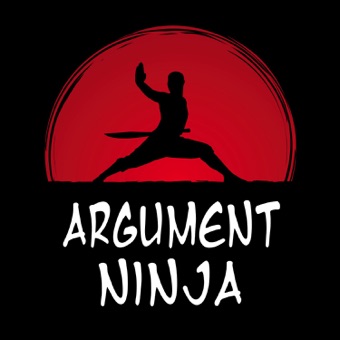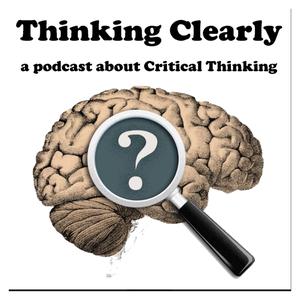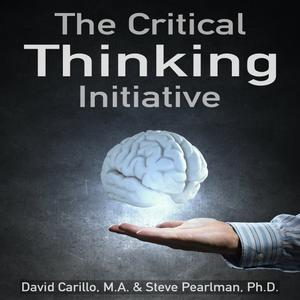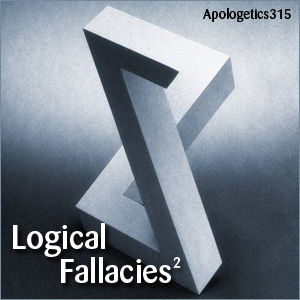
The Argument Ninja Podcast
Kevin deLaplante | Philosopher and Critical Thinking Educator
The Argument Ninja podcast is dedicated to helping you improve your skills at rational persuasion. Let philosopher Kevin deLaplante introduce you to a unique approach to critical thinking, inspired by martial arts training principles, that combines logic and argumentation with the latest research on the psychology of persuasion and belief.
- 1 hour 21 minutes038 - Tribal Literacy and Emotional Intelligence
On this episode of the Argument Ninja podcast I share the audio from an interview I did with Brittney-Nichole Connor-Savarda for her for a new podcast, Living and Leading with Emotional Intelligence.
Brittney-Nicole's show coincides with the publication of a book she's written on the topic of emotional intelligence, The EQ Deficiency.
Topics discussed:
- How Brittney-Nichole came to be familiar with my work
- Definitions of tribalism and tribal psychology
- The evolutionary roots of tribal psychology; positive and negative aspects of tribalism
- Definition of polarization, and the effects of increasing polarization
- Why certain kinds of truth-seeking communication can only happen in the interstitial spaces between ideologically charged tribal zones
- Why "complexity is unstable" within polarized groups
- Strategies for improving our emotional intelligence by learning more about, and embracing, our tribal psychology
- Why "character is contextual", and how we can take advantage of this fact for personal growth
- Mental models for understanding human nature and social change, and cultivating emotional intelligence
Show notes:
https://kevindelaplante.com/038-tribal-literacy-and-emotional-intelligence/
Video interview on Brittney-Nichole's channel:
31 October 2020, 10:16 pm - 1 hour 7 minutes037 - 3 Honest Updates: On Failure, Living With a Stutter, and Accepting My Comfort Zone
On this episode of the Argument Ninja podcast I talk openly about why this is the first new episode I've produced in 7 months, and the lessons I'm learning as a life-long stutterer.
https://kevindelaplante.com/3-honest-updates
Timestamps00:00 - 03:12 Introduction
03:12 - 05:23 The move and web consolidation update
05:23 - 07:24 Failing at the one thing I set out to do
07:24 - 13:49 Experiments, consulting side-gigs, and coaching
13:40 - 18:12 Argument Ninja video community meetings—motivations and lessons learned
18:12 - 33:34 My history as a stutterer, and how it's influenced my work
33:34 - 42:44 On accepting my comfort zone
42:44 - 48:46 Retreating from my role as community builder (and trying to understand why)
48:46 - 57:53 My views on social media and how I choose to use it
57:53 - 01:06:22 A new opportunity that changes the equation
01:06:22 - 01:07:50 Wrapping up
5 April 2020, 2:25 pm - 1 hour 9 minutes036 - Understanding Complex Social Phenomena: More Theories of the Causes of Social Polarization
On this episode of the Argument Ninja podcast I talk about the difficulty of judging how much we really understand about the causes of complex social phenomena—even if we do lots of research and self-study.
To help make the case I’m continuing my survey of different theories of the causes of the increase in social polarization that we’re currently experiencing.
On this episode I look specifically at the work of two social scientists who have written extensively on this topic:
- Karen Stenner on the “authoritarian” personality type. Her 2005 book The Authoritarian Dynamic can be read as predicting the expansion of right-wing populism that contributed to the rise of Trump and Brexit. Stenner's work has been influential on Jonathan Haidt's analysis of polarization.
- Eric Kauffman on the effects of immigration on polarization in white majority countries. His latest book Whiteshift explores how demographic shifts are driving cultural conflict, and how this will likely play out in the longer run.
But before I get to these topics, I give some Argument Ninja Dojo updates, do a recap of episode 034, and present a conceptual model for how we should think about the epistemological challenge of understanding complex social phenomena like polarization.
Timestamps00:00 - 01:22 Introduction
01:22 - 06:31 Argument Ninja Dojo Announcements
06:31 - 11:45 Recap of Episode 034
11:45 - 14:41 Outline of What's to Come
14:41 - 23:40 Argument Matrices and the Problem of Calibrating Our Knowledge
23:40 - 25:48 The Epistemological Challenge of Understanding Complex Social Phenomena
25:48 - 42:44 Karen Stenner: The Authoritarian Dynamic
42:44 - 01:04:35 Eric Kauffman: Whiteshift and "Multivocal" Nationalism
01:04:35 - 01:07:56 Reasons to Think We Know Less Than We Think
01:07:56 - 01:08:44 Reminder: Argument Ninja Dojo Discount Coupon Links
Links28 August 2019, 5:43 pm - 1 hour 14 minutes035 - Updates and a Street Epistemology Interview
On episode 035 of the Argument Ninja podcast I share updates on new course development over at kevindelaplante.com, and I share both the audio and the video of a one-hour interview I did with the hosts of the Epistemic podcast, which focuses on "street epistemology".
Click to view the video interview on YouTube
(full URL: https://youtu.be/rHQYHUksJFk)
Timestamps:
0:56 - Topics discussed in the interview
2:15 - New courses in development on kevindelaplante.com
4:37 - How I'm pitching the new courses
5:12 - First course: Become an Argument Ninja
5:43 - Second course: How to Build a Good Argument (Argument and Reason)
6:11 - Third course: How to Know What You're Talking About (Argument and Knowledge)
7:00 - Fourth course: How to Be Understood (Argument and Communication)
7:32 - Fifth course: How to Win Over Your Audience (Argument and Persuasion)
8:52 - Introducing the interview, "street epistemology", and the hosts
11:57 - Critical thinking versus rational persuasion
13:19 - Two approaches to argumentation
16:34 - Why philosophers are suspicious of rhetoric
17:20 - How I was teaching critical thinking back when I was a university professor
17:33 - Origins of the "critical thinking movement" in higher education
21:12 - Jonathan Haidt's "Elephant and the Rider" model
23:54 - My "core belief network" model for helping strategize conversations
29:50 - The virtues of simplicity and clarity
32:05 - The culture of "smartness" in academia
34:49 - Viewing rational persuasion as a martial art
40:49 - Are there some people who should not be given training in these tools?
43:30 - Why critical thinking has a bad name in some circles
47:25 - Is the term "critical thinking" useful if everyone is willing to claim it?
51:21 - When the critical thinking label becomes politicized
51:53 - Why I avoid talking about my personal views on polarized topics
54:26 - Critical thinking, tribalism and polarization
01:01:35 - Keep your core small
01:01:35 - Is street epistemology part of a "mixed martial arts" approach to critical thinking?
01:08:14 - Can scientists do better at communicating with the public?
Links:
My promo video for the new Argument Ninja courses
The Critical Thinking Movement in higher education (historical overview)
17 April 2019, 3:16 pm - 50 minutes 30 seconds034 - Understanding the Causes of Polarization (Part 1): Depolarization Initiatives
In episode 024 of the Argument Ninja Podcast I'm starting a series of episodes that will explore different models of the causes of social and political polarization, and introduce some general principles for thinking critically about complex social phenomena like polarization.
In this episode (Part 1) I examine models of polarization and social change that are implicit in the depolarization strategies of three different depolarizing initiatives: Better Angels, AllSides, and OpenMind.
https://kevindelaplante.com/034-understanding-the-causes-of-polarization-part-1/
Timestamps:
00:00 Why I'm doing a multi-part series on understanding the causes of polarization
06:46 Ideological polarization and evidence for increases
09:36 Affective polarization and evidence for increases
13:12 The depolarization strategy of Better Angels
20:25 The depolarization strategy of AllSides
26:32 Jonathan Haidt and OpenMind
31:48 The four-factor account of the causes of polarization in Chapter 3 of The Coddling of the American Mind
32:22 Loss of a common enemy or challenge
33:53 Social sorting and the emergence of homogeneous political identity groups
38:14 Partisan media and filter bubbles
39:05 Rise of negative partisanship in government
43:24 On the mismatch between individual-level strategies for depolarization, and multi-level, multi-scalar theories of the causes polarization
49:06 Wrapping up
Links:
Better Angels (https://www.better-angels.org/)
AllSides (https://www.allsides.com)
AllSides For Schools (https://allsidesforschools.org/)
LivingRoom Conversations (https://www.livingroomconversations.org/)
OpenMind (https://openmindplatform.org/)
The Righteous Mind (https://righteousmind.com/)
The Coddling of the American Mind (https://www.thecoddling.com/)
6 March 2019, 12:59 am - 56 minutes 50 seconds033 - Critical Thinking About Conspiracies
On this episode of the Argument Ninja Podcast I'm presenting edited versions of last three episodes of my first podcast show that I produced in 2010-11. These were the last episodes I produced of that podcast series, and I discuss why in the introduction.
The last three episodes were on the subject of conspiracies and conspiracy theories.
https://kevindelaplante.com/033-critical-thinking-about-conspiracies/
Topics discussed in this episode include:
- the definition of a conspiracy, and a conspiracy theory
- local vs global conspiracies
- default skepticism about conspiracies
- 9-11, the Moon Landings, the New World Order, mind control technologies, and other conspiracy theory examples
- real government conspiracies: COINTELPRO (FBI), MK-ULTRA (CIA)
- falsifiable and unfalsifiable conspiracies
- lessons each side can learn
11 January 2019, 3:40 pm - 40 minutes032 - When Tribalism Becomes Pathological
On this episode of the Argument Ninja podcast I share the audio for the three videos I recently produced on Cognitive Biases, Tribalism and Politics. It was designed as one long video presenting one long argument, so the audio works well in this continuous format.
Show notes and links:
https://kevindelaplante.com/032-when-tribalism-becomes-pathological
Topics covered:
- the "two movies" phenomenon (Scott Adams)
- the distinction between "psychological" value pluralism and "philosophical" value pluralism
- what is affect bias?
- what is cultural cognition?
- your "value channel profile"
- what is the focusing illusion?
- what is availability bias?
- what is the mere-exposure effect?
- how do these cognitive biases interact to create an exaggerated and distorted perception of reality?
- a three-channel model of political values
- value channel profiles for the libertarian, the progressive liberal, and the conservative
- can I be a libertarian AND a progressive liberal AND a conservative?
- sources of "pathological tribalism"
- analogy: Black Mirror, "Men Against Fire"
- trading off critical thinking values and political values
19 December 2018, 6:50 pm - 26 minutes 12 seconds031 - New Cartoon Videos Plus a Fall 2018 Update
On this episode of the Argument Ninja podcast I talk about the three new videos I recently produced on Cognitive Biases, Tribalism and Politics, and I give an update on what's been keeping me busy this fall.
Timestamps:
- Intro 00:00
- What have I been up to? 01:24
- Creating new videos 01:53
- Keynote presenting at a conference in November 02:11
- Consulting work 02:54
- New tribalism videos 07:55
- Inspiration for the videos 08:52
- Findings of the "Hidden Tribes" report 09:48
- The overall argument of the videos 12:43
- Lessons learned from producing content in different formats for different platforms 20:54
- Creating a new video course based on the tribalism and critical thinking videos 24:03
- Audio versions of the Critical Thinker Academy courses available through Patreon 24:44
Links:
- Show notes for this episode on kevindelaplante.com
- Show notes and links to the "Cognitive Biases, Tribalism and Politics" videos
- Direct links to the videos on YouTube:
- Part 1 - https://youtu.be/2NjOzvM41zM
- Part 2 - https://youtu.be/M4x4p3kmWQc
- Part 3 - https://youtu.be/PIAJxU5DO7s
- Kevin's Patreon page
- The Critical Thinker Academy
11 December 2018, 8:11 pm - 16 minutes 15 seconds030 - Behind the Scenes of My New Video Course
On this episode I talk about the genesis of my new video course, "The Vocabulary of Science: First Steps to Science Literacy", and my decision to start producing the Argument Ninja podcast in both audio and video formats.
Next episode will be an "Ask Me Anything" episode. You can submit questions at this URL:
Listeners can access the video course at the Critical Thinker Academy or on Udemy. Follow the links below:
At the Critical Thinker Academy (included in the site-wide subscription for as low as $3/month):
On Udemy (this link will give you a HUGE discount on the retail price):
Supporting members on Patreon also get access to all of the content at the Critical Thinker Academy, including this new course:
The video version of this episode!
Show notes for this episode:
- https://kevindelaplante.com/30-behind-the-scenes-of-my-new-video-course/
In This Episode:
(0:00 - 0:45) Introductory remarks - new course, and this podcast has both audio and video versions
(0:45 - 1:10) Next episode is an "Ask Me Anything" episode
(1:10 - 4:00) Introduction to my new Vocabulary of Science video course. Play the promo video for the course.
(4:00 - 5:15) How to access the course.
(5:15 - 8:40) The history of this course: science education; producing a "critical thinking about science" podcast; designing a curriculum that teaches genuine science literacy.
(8:40 - 10:00) Pivoting toward the Argument Ninja concept.
(10:00 - 11:34) The decision to create new courses for Udemy and the Critical Thinker Academy.
(11:34 - 12:10) Why this topic rather than some other topic?; teaching philosophy of science at Carleton University.
(12:10 - 13:30) The perfect student assignment for this course; video critique exercise.
(13:30 - 14:55) The new video format for producing courses and the podcast.
(14:55 - 16:15) Wrapping up; reminder, AMA questions for next episode.
10 September 2018, 1:04 pm - 52 minutes 37 seconds029 - How to Raise a Critical Thinker
On this episode of the Argument Ninja podcast I talk about the importance of critical thinking education for kids and teens, and what parents can do to help their kids become better critical thinkers.
***
In This Episode:
(0:00 - 4:57) Introduction
(4:57 - 8:51) Critical Thinking Values
(8:51 - 12:58) Why This Matters Even More to Young People
(12:58 - 15:27) The Light Side and the Dark Side
(15:27 - 16:25) The Martial Context of Critical Thinking
(16:25 - 19:00) Social Media, Commercial Digital Culture and the Martial Context of Critical Thinking
(19:00 - 22:42) Polarization and Critical Thinking: The One Ring to Rule Them All
(22:42 - 24:45) Summing Up
(24:45 - 27:47) Recommendation 1: Prioritize Role Modeling
(27:47 - 32:19) Recommendation 2: Role-Model Intellectual Virtues
(32:19 - 38:56) Recommendation 3: Depolarize Your Home
(38:56 - 42:04) Recommendation 4: Be Critical of Social Media
(42:04 - 48:00) Recommendation 5: Develop the Right Background Knowledge
(48:00 - 52:37) Wrapping Up
***
You can find show notes with links and supporting resources at:
https://kevindelaplante.com/029-how-to-raise-a-critical-thinker
Learn how you can support Kevin’s work on Patreon:
https://patreon.com/kevindelaplante
Anyone who signs up on Patreon gets access to all of the video tutorial courses at the Critical Thinker Academy website:
https://criticalthinkeracademy.com
Follow Kevin’s updates on Facebook:
https://facebook.com/criticalthinkeracademy
3 August 2018, 4:45 pm - 52 minutes 23 seconds028 - Tribalism Isn't the Problem
On this episode I’ve got an interview lined up for you that I did with Bob Froehlich, who hosts the Thinking Clearly radio program and podcast over at KMUD community radio in Redway, California.
Our topic was critical thinking and tribalism, very much in the vein of what I’ve been talking about in my recent sketchbook video series titled, appropriately, "Critical Thinking and Tribalism".
(To see the first three videos in this series, follow the links in the show notes below).
If you’ve been following my work a certain amount of this will be familiar, but in this interview we covered some new topics relating to tribalism and polarization that I haven’t discussed before; for example, the distinction between ideological polarization and social polarization; evidence that social polarization along political lines has increased dramatically in recent years, especially in the US; and some discussion of the causes of this increase in polarization.
We also answer a couple of live call-ins from listeners!
We hear a lot of talk about the "rediscovery of tribal psychology "in recent years, but my view is that it’s misguided to think of tribal psychology per se as the problem.
The problem facing us today is how our tribal psychology operates when polarization becomes extreme.
So the more pressing issue is to understand the psychological and social factors that increase or decrease polarization.
***
In This Episode:
(0:00 - 4:25) Introductory remarks from Kevin
(4:25 - 1:50) Introductory remarks from Bob Froelich
(5:56 - 6:34) What is a tribe?
(6:34 - 7:00) What is tribalism?
(7:40 - 9:15) What prompted me to engage with this issue of tribalism? How is it relevant to critical thinking?
(9:30 - 13:16) What is "tribal psychology"?
(13:16 - 15:47) Examples of group identities that can become tribal
(15:47 - 19:50) Tribal psychology as an evolutionary adaptation for human survival
(20:00 - 21:13) In-group solidarity and out-group antipathy/hostility
(21:13 - 22:27) Good news: tribal identification may be hardwired, but tribal categories are flexible
(22:27 - 26:15) The importance of signaling to demonstrate membership in and solidarity with tribal groups; the rationality of tribal solidarity; signaling as unconscious cognitive bias
(26:15 - 29:35) The distinction between tribalism and polarization, and why the problem is polarization, not tribalism
(30:23 - 34:50) Ideological polarization versus social polarization; evidence for increasing social polarization; shout-out to Lillian Mason
(34:50 - 35:30) Social sorting and segregation as a cause of increased social polarization
(35:30 - 37:05) Loss of viewpoint diversity as an obstacle to critical thinking
(38:05 - 40:25) What can be done to foster more productive relationships between in-groups that have become more polarized?
(40:25 - 42:30) What's ahead for me, what I'm working on right now
(43:27 - 47:45 ) Caller 1 - concerns with using the word "tribe" and "tribal" in this context when Native Americans and First Nations Peoples use that term to identify their political and social groups
(48:37 - 50:40) Caller 2 - wants me to write a book!
(50:55 - 52:12) Wrapping up: there's a broader story to be told about the forces that are exacerbating the problems discussed on this show
***
References and Links:
- Thinking Clearly Radio Program
- Videos in my Critical Thinking and Tribalism series:
- Lilliana Mason's homepage, and her book, Uncivil Agreement: How Politics Became Our Identity
- My Patreon support page
- Critical Thinker Academy (criticalthinkeracademy.com)
12 June 2018, 8:15 pm - More Episodes? Get the App
- https://kevindelaplante.com
- English
Your feedback is valuable to us. Should you encounter any bugs, glitches, lack of functionality or other problems, please email us on [email protected] or join Moon.FM Telegram Group where you can talk directly to the dev team who are happy to answer any queries.
 The Street Epistemology Podcast
The Street Epistemology Podcast
 Thinking Clearly
Thinking Clearly
 The Critical Thinking Initiative
The Critical Thinking Initiative
 Logical Fallacies
Logical Fallacies
 Logical Fallacies 2
Logical Fallacies 2